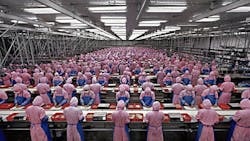IPhone Assembler's Billionaire CEO Chafes at China Overtime Caps
by Debby Wu
The billionaire chief of Foxconn Technology Group, Apple Inc.’s main iPhone assembler, argues that China’s “unreasonable” restrictions on overtime hours hurts his workers and the company’s competitiveness.
Taking aim at criticism Foxconn over-works its employees to meet soaring demand before the annual holiday shopping season, Terry Gou told shareholders his workers actually want to work more hours and that forcing them to put in less time reduces their income.
Foxconn, which as China’s largest private employer keeps about a million on its payroll, has drawn fire for years over practices such as allowing overtime to soar during the peak season, when it sharply ramps up production to get devices to market in time for the holidays. Gou however said that was normal practice in other parts of the world, and stressed that Foxconn’s biggest challenge now was not labor but U.S.-Chinese tensions that threaten to up-end the global supply chain.
“We have a number of response plans,” Gou said at the annual shareholder meeting for Hon Hai Precision Industry Co., Foxconn’s main listed unit. “The trade war is not about trade, but it is a tech war, and it is a manufacturing war.”
China’s rising economic and technological prowess is at the heart of a dispute with the U.S. that, while waged through retaliatory trade tariffs, is also aimed at prying open the Asian nation to U.S. businesses and restricting the use of government aid to advance strategically important industries. Gou however refrained from criticizing either side in current negotiations, saving his sharpest comments for domestic labor law.
Gou argued that Foxconn should be governed by U.S. regulations since, as the world’s largest electronics contract manufacturer, a large swath of its customers from Apple Inc. to Amazon.com Inc. are American. The CEO also repeated a pledge to employ robots to replace 80% of workers in coming years, as one potential solution.
“China has tougher overtime regulations than the U.S. and the European Union, and they understand those are unreasonable regulations, unreasonable laws,” Gou said. “Right now during the low season we are following China’s regulations, and in the peak season we are following U.S. regulations.”
About the Author
Bloomberg
Licensed content from Bloomberg, copyright 2016.
